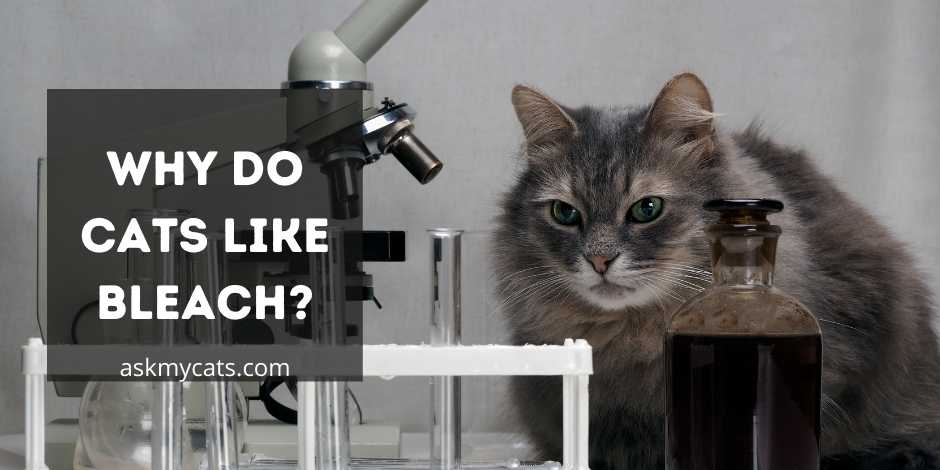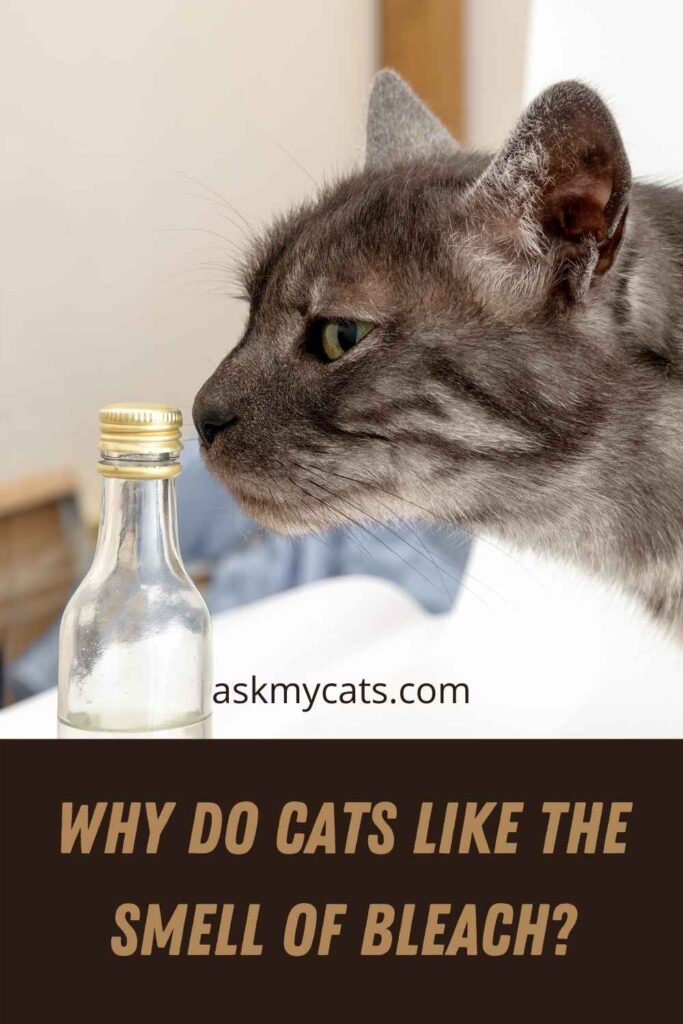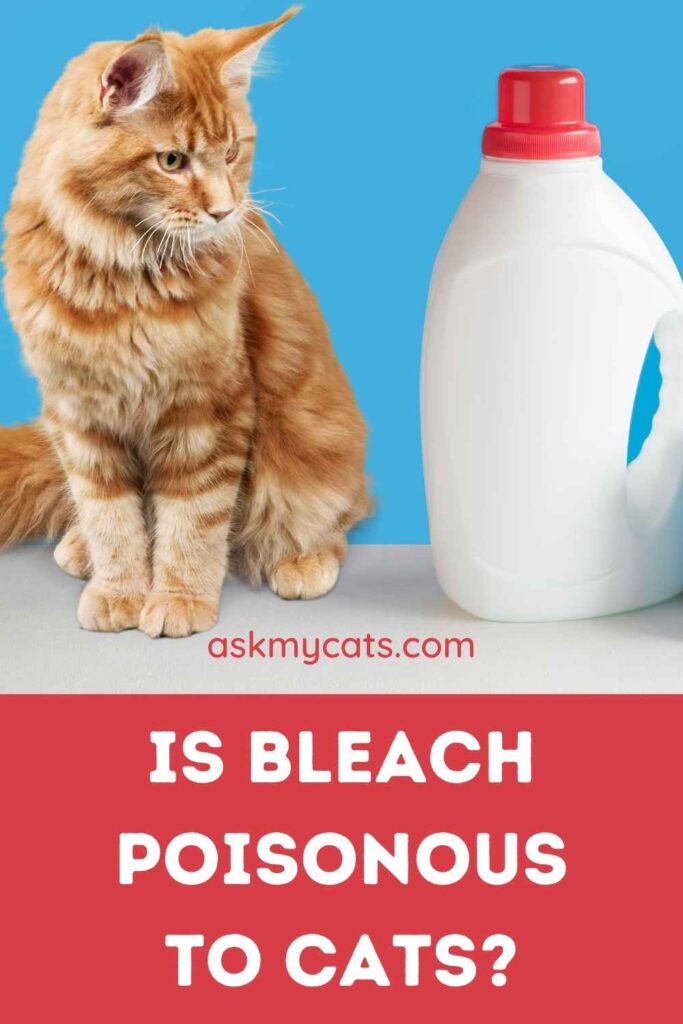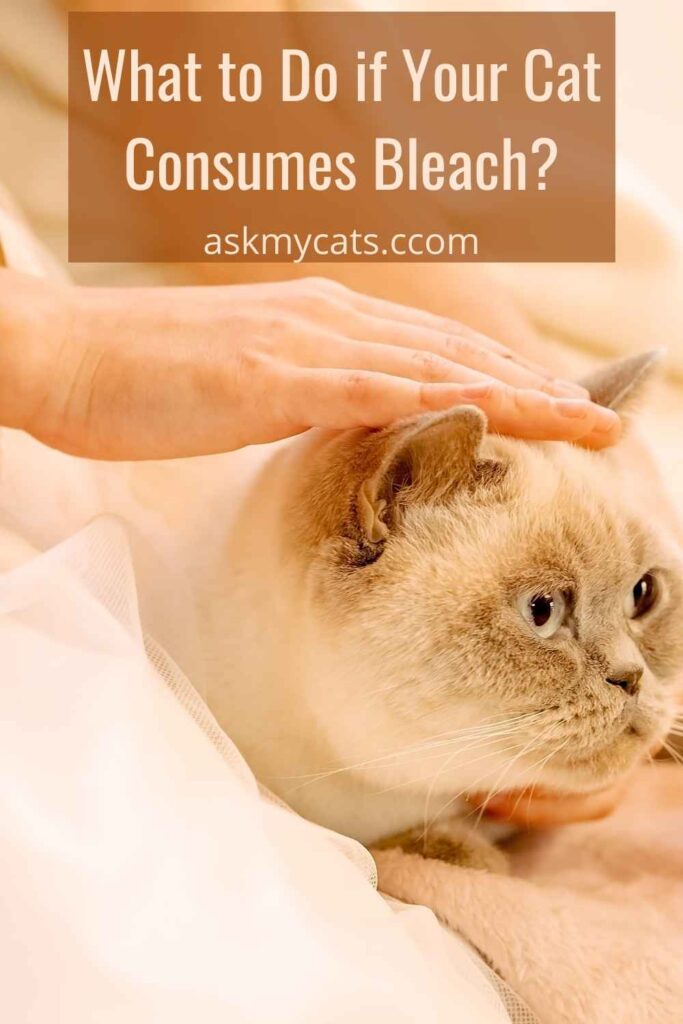Have you ever seen your cat reacting strangely to bleach?
Don’t worry; your cat isn’t the only one with this issue. Many cat owners have discovered that the scent of chlorine attracts their feline companion. Some cats respond to bleach in the same way they do to catnip.
So why does this thing happen? Isn’t bleach a poison? When your cat consumes chlorine, what do you do?
Cats are attracted to the chlorine which is present in the bleach.
First and foremost, do not be alarmed. We’ll take a look at it together. We hope that by the end of this article, you’ll have a clearer idea of why cats like bleach and what to do if your cat ingests it.


Give Your Cat the Perfect Day
Get the Free Ebook!
Why Do Cats Like Bleach?
So, what is it with bleach that attracts cats?
Regrettably, we have no way of knowing.
However, experts suspect it has something to do with the bleach’s chemical structure. They believe cats are drawn to the chlorine in bleach in particular.
Catnip and chlorine, for example, are likely to contain a pheromone that cats react to. A pheromone is a chemical that allows many animals to react in a normal way.
As a result, cats are drawn to the scent of pheromones or compounds that resemble pheromones. And they begin to act differently as a result. When your cat is exposed to chlorine or catnip, it can droll, roll about, or purr.
The most famous theory is because something about the chemical composition of bleach, such as chlorine, attracts cats. But this begs the question of whether cats like chlorine.
The most widely accepted explanation is that cats have a strongly evolved sense of smell – much more nuanced than humans – and that anything like chlorine may be linked to their pheromones, causing a chemical, hormonal response to the fragrance.
Rubbing, purring, and drooling are common responses, which are somewhat close to catnip’s effect on cats.
Although pet researchers haven’t come to a definitive conclusion as to why cats are attracted to bleach, a clear analogy is that it has the same impact on cats as catnip.
Why Do Cats Like The Smell of Bleach?
Bleach emits molecules that are similar to pheromones used in mating. A catnip-like reaction may result from the chemical interaction. Some cats mistake the odor for an intruder.

1. Sex (Mating)
First, it’s possible that your bleach-loving cat is experiencing a sexual or hormone-related response and is enjoying it.
Since there’s no other kitty around, everything smells like a mating season, all the rolling and scratching may be half turn-on and half confusion.
2. Drugs
Second, they may be experiencing the ‘catnip’ reaction, which is not the same as the ‘catnip’ reaction, but it may seem familiar.
Drugs alter your attitudes and attitudes by altering your brain function for a short period of time. Catnip and chlorine all seem to suit the bill.
3. Home Invasion
Finally, the hormones could have the odor of an attacker rather than a possible mate.
As a result, rubbing may be a method of (non-spraying) marking action used to re-odorize the area and regain its territories. Cats that spray chlorine or drag their butts across it are more likely to be territorial.
Surprisingly, the solution does not have to be based solely on either of these theories. It’s possible if more than one of the bleach compounds triggers a reaction.
Furthermore, even though the responses seem to be the same, they may be different.
Is Bleach Smell Bad For Cats?
Experts say that cleaners with strong odors that guarantee results should alert pet owners, especially cat owners, to the threat.
Alcohol, chlorine, hydrogen peroxide, chemical compounds containing the term “phenol,” and other additives that make disinfectants effective are harmful to companion animals.
While it can seem innocuous, if your cat rubs in bleach and then smells it off, they are ingesting an irritant toxin (sodium hypochlorite), which triggers ulceration in the mouth and gastrointestinal tract lining (or eyes if it gets in them).
Also, check out Does Bleach Keep Cats Away?
Does Bleach Attract Cats To Pee?
It is advisable not to use bleaches or other cleaners with a very strong odor to clean as it may attract the cats to pee there again.
Chlorine gas can also be released when chlorine is combined with urine, such as when washing the area behind a toilet or cleaning pet stains.
Both chloramine and chlorine gases have a strong odor that causes watering of the eyes, a runny nose, and coughing.
Is Bleach Poisonous to Cats?
However, this is highly dependent on the kind of bleach used and how your cat eats it.
Your pet would not be poisoned if they smell bleach. However, swallowing bleach may have significant health consequences.

Furthermore, heavily diluted bleach is less hazardous than undiluted bleach.
You’re only using a filtered form of commercial bleach at home. You should also apply water to dilute the bleach further.
Many pet owners fear about their cat’s well-being and welfare because of this reaction, but the slight scent of bleach and a cat’s reaction to it is completely harmless.
However, eating or ingesting a large amount of bleach may cause severe health problems in cats, necessitating emergency veterinary care.
If you suspect your cat has swallowed bleach, watch for signs such as vomiting, sore throat, chest pain, heavy drooling, and a bleached texture of the fur around the paws or lips, as well as the scent of bleach or chlorine.
If your pet is exhibiting these signs, give them milk or water and take them to the veterinarian as soon as possible; do not threaten to make them vomit.
The vet will help to handle the cat by feeding it massive doses of milk or water, and if you respond quickly and successfully, the prognosis is normally fine.
So you don’t have to wonder if your cat gets ecstatic about your bleach-scented paws every time you clean the toilet.
Their fondness for perfume is a typical cat trait, but it does mean that you must be extra careful to keep any bleach-containing chemicals out of the reach of your feline companion.
How to Prevent Bleach Poisoning In Cats?
The only way to protect your cat from being poisoned by chlorine is to keep them away from it.
Place the cat in another room if you’re going to use chlorine. This will prevent them from drinking more of the remedy.
It’s also a good idea to dilute the bleach solution. Before you use the chlorine, make sure it has a lot of water in it. Bleach that has been highly diluted is less harmful to cats than bleach that has not been diluted.
Clean up any spills and store the leftover bleach in a safe position out of sight of your cat until you’ve finished using it.
Since the bleach gases are not harmful to your pet, you should bring your cat back into the area after the bleach has been washed up.
Since they can smell the gases, they can either roll about or droll. They shouldn’t get chlorine poisoning as long as there isn’t enough bleach for them to lick or drink.
Signs and Symptoms of Bleach Poisoning
You should be mindful of the symptoms of poisoning whether your cat drinks or consumes chlorine.
The bleach fumes can cause your cat to have a natural reaction. It’s possible that they’ll droll, purr, or roll about in the field.
This does not imply that they have been poisoned. This is also a harmless reaction they get, close to the one they get when they are exposed to catnip.
There are, however, certain indicators that your cat has ingested the poison. There are some of them:
- Inflammation of the skin
- Throwing up
- Stomach ache
- Patches of white across the mouth
- Drooling too
These symptoms may indicate that your cat ate bleach. And if this does, you must be prepared to handle the resulting effects.
What to Do if Your Cat Consumes Bleach?
It’s important to remain cool if your cat ingested bleach. Yes, this is a traumatic and frightening situation. However, there are treatments available to alleviate the effects.

1. Determine the Type of Bleach They Consumed
If at all practicable, try to find out what kind of bleach your cat drank. You would be able to relieve the symptoms at home if they drank a small dose of much-diluted bleach.
However, whether your cat ingested undiluted bleach or you are unsure of the sort, you can take your cat to a veterinarian right away.
2. Treat the Symptoms
You should aim to flush the solvent from their intestines. Having the pet to drink water or milk is the easiest way to do this.
This will aid in the removal of the harmful bleach from their system.
However, as most pet owners are aware, forcing the cat to drink can be a difficult task. If your pet refuses to drink, you can take them to the veterinarian right away.
If your cat drinks water or milk, he or she may show signs which can subside in 30 to 45 minutes. Consult the veterinarian if the signs last.
3. Prevention
Remember that keeping your pet safe from chlorine is the only way to protect them from swallowing it.
Clean up the place if your cat drank bleach. Even, keep the chlorine out of their control from now on.
Frequently Asked Questions
What do I do if my cat drinks bleach?
Encourage your pet to drink milk or water after it has consumed chlorine. Inappetent animals, as well as those with trouble feeding or feeling discomfort around the mouth or in the belly, should be taken to the veterinarian.
Can bleach kill cats?
Cats, dogs, and other creatures may be severely harmed by household bleach. Cleaning with bleach will unintentionally expose the animals to the chemical, even though they won’t deliberately absorb it due to the strong odor. Bleach poisoning can cause vomiting, convulsions, and even death in dogs.
Final Words
While there hasn’t been much study on the topic, most people believe cats are drawn to the chlorine in bleach. They have the same natural reaction to this compound as they do to catnip.
Cats, on the other hand, will get chlorine poisoning if they drink bleach. They could vomit or suffer a chemical burn as a result of the exposure.
If this occurs, give your cat some water or milk to help flush the poison out. Alternatively, if the poisoning seems to be serious, take the pet to the veterinarian.
Finally, the only way to deal with bleach poisoning is to avoid it altogether.
Is bleach attracting your cat? Please share your story in the comments section below.
